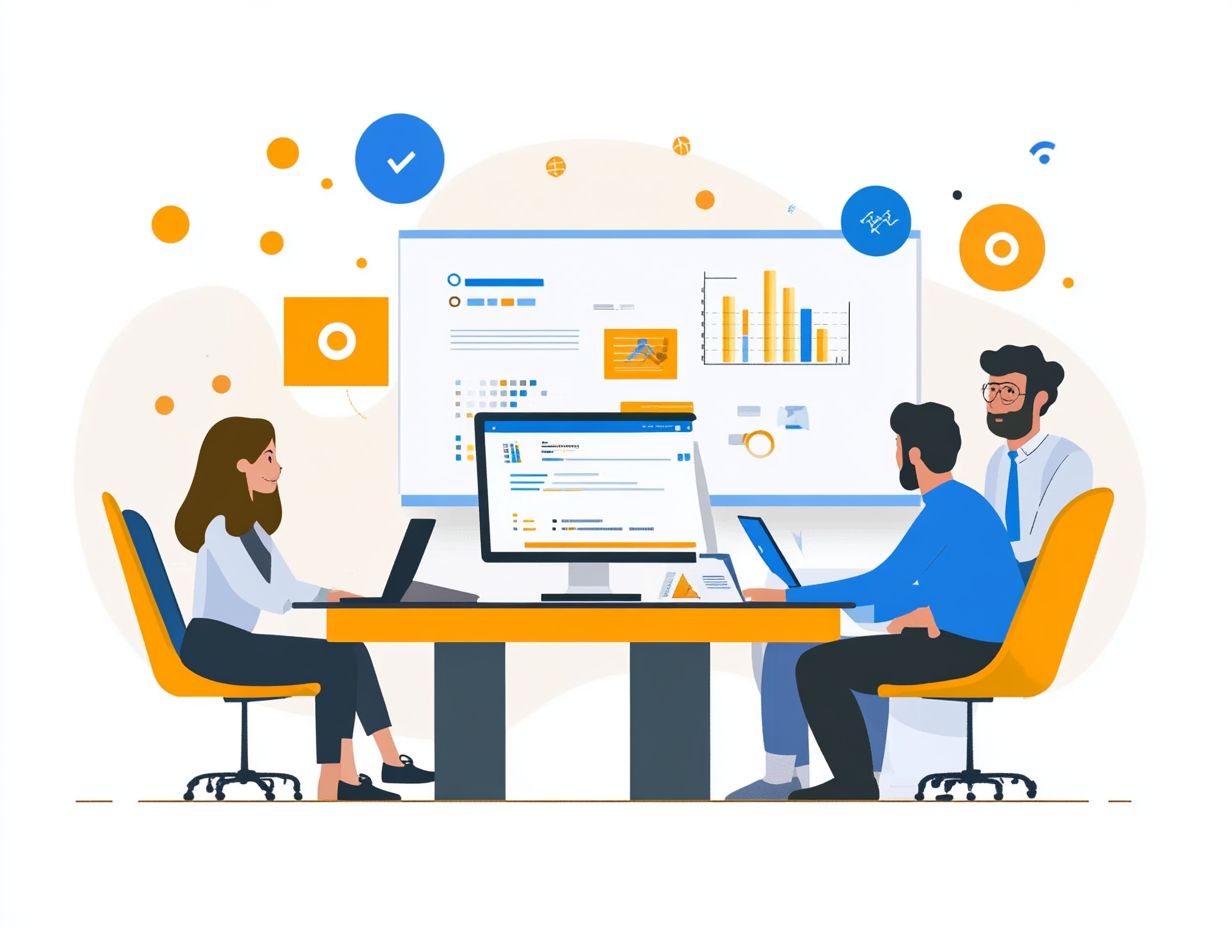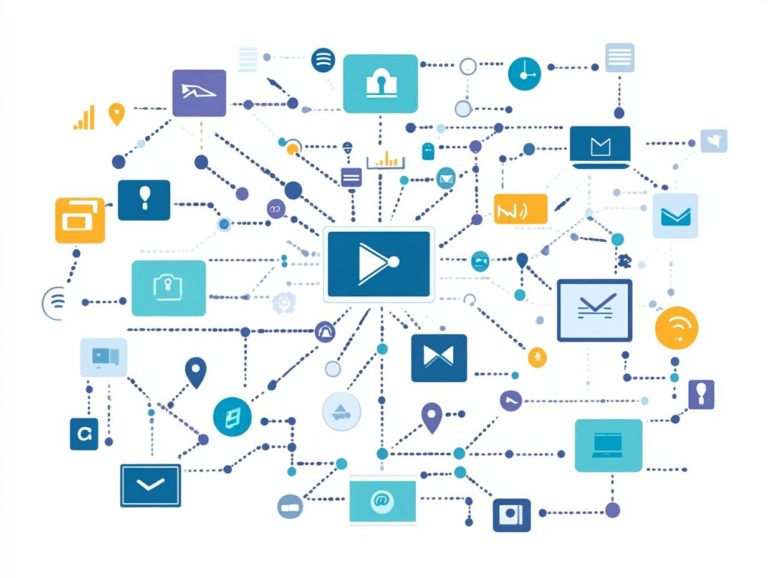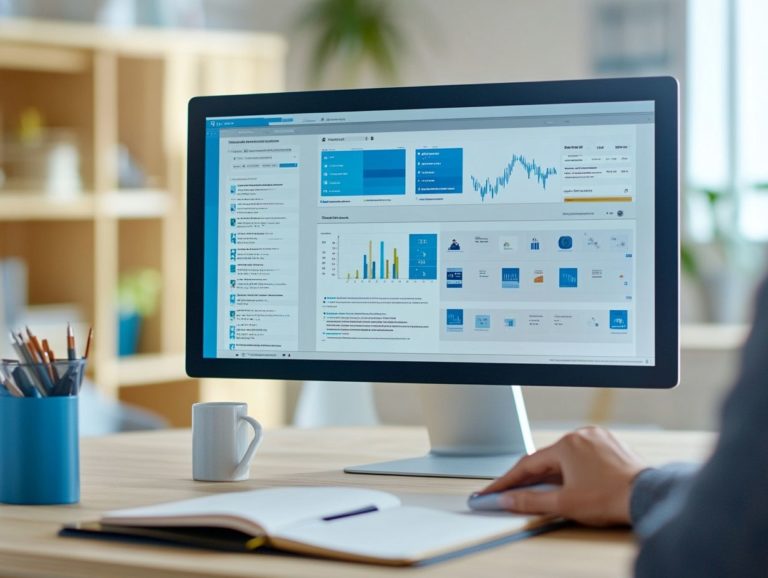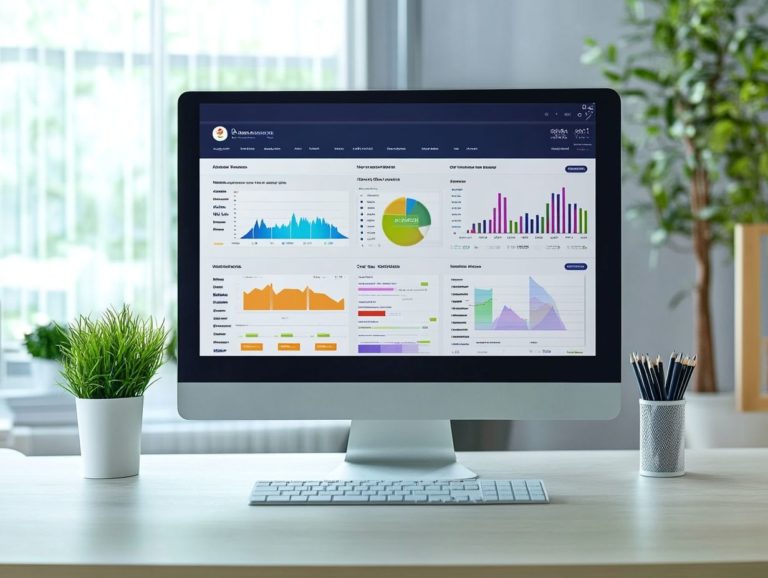How to Optimize CRM Software Usage?
In today s fast-paced business landscape, Customer Relationship Management (CRM) software is essential for building strong customer relationships and spurring growth.
Let’s explore what CRM software is and why it’s vital for your business. You’ll uncover the myriad benefits of optimizing its use, from heightened efficiency to improved customer relationships.
While challenges may arise, you ll find insights into common issues and practical strategies for effective implementation.
Key metrics for measuring your success will also be highlighted, ensuring that your CRM efforts deliver optimal results.
Jump in now to unlock the potential of your CRM software!
Contents
- Key Takeaways:
- Benefits of Optimizing CRM Software Usage
- Common Challenges in CRM Software Usage
- Strategies for Optimizing CRM Software Usage
- Regular Maintenance and Updates
- Measuring and Tracking Success
- Key Metrics to Monitor
- Frequently Asked Questions
- Why should you care about CRM software?
- How can you optimize the usage of your CRM software?
- What data should you enter into the CRM software?
- How often should you update and clean your CRM data?
- What are some best practices for using CRM software?
- Can I customize my CRM software to fit my specific business needs?
Key Takeaways:

Empower your team with proper training and education to fully utilize the potential of CRM software.
Consistent maintenance and updates of CRM software can enhance its efficiency and improve customer relationships, so understanding how to set up CRM software for your team is crucial.
Measure success by monitoring key metrics and addressing challenges to optimize CRM software usage, following CRM software best practices for increased productivity.
What is CRM Software and Why is it Important?
Customer Relationship Management (CRM) software is a critical asset for effectively managing your customer relationships and interactions, ultimately driving both acquisition and retention.
By centralizing your customer information, you streamline your marketing and sales efforts. This ensures that your data remains both clean and accurate.
In a landscape where data-driven decision-making is essential, maintaining usable data is crucial for fully understanding your customers’ needs.
Integrating CRM systems with various operational tools enhances this capability, offering you a comprehensive view of customer interactions. Solutions like Salesforce and Microsoft Dynamics not only improve communication across departments but also provide valuable insights into customer behavior and preferences.
This insight allows you to tailor your approach, leading to higher conversion rates and deeper customer loyalty. By leveraging these advanced systems, you can cultivate lasting relationships, ultimately driving sustained growth and increased profitability for your organization.
Benefits of Optimizing CRM Software Usage
Optimizing CRM software usage presents a wealth of benefits that can profoundly enhance your customer relationships, streamline your processes, and elevate overall productivity within your organization. To maximize these advantages, it’s important to follow best practices for using CRM software.
By employing CRM optimization techniques, you can harness customer support tools to their fullest potential. This ensures that optimizing your CRM for e-commerce allows ranking potential customers based on their likelihood to buy and personalized interactions take center stage.
This approach enhances data hygiene and automates tasks that would otherwise drain your valuable time and resources.
As a result, your organization becomes more agile and responsive to customer needs, setting the stage for lasting success.
Increased Efficiency and Productivity
Increased efficiency and productivity are essential for any organization aiming to excel in a competitive market, and CRM optimization is pivotal in reaching these objectives.
By maintaining data hygiene and automating redundant processes, you can streamline your marketing and sales efforts. This ultimately enhances your customer acquisition strategies.
For example, automating lead scoring and follow-up reminders can drastically cut down the time your sales team spends manually sifting through contacts, allowing them to concentrate on higher-value interactions.
Utilizing CRM tools to keep your databases clean and organized minimizes the risks of errors from duplicated or outdated information, fostering trust and reliability with potential customers.
Integrating with marketing automation platforms ensures that your targeted campaigns reach the right audience swiftly, enhancing both engagement and conversion rates.
This harmonious relationship between efficient CRM usage and effective marketing not only elevates your customer acquisition rates but also strengthens long-term client relationships, paving the way for sustained business growth.
Better Customer Relationships

Using CRM software effectively allows you to build better customer relationships through personalized interactions that enhance retention.
Integrating customer support tools gives you deeper insights into your customers’ needs, helping you respond effectively. This fosters loyalty and connection, particularly in competitive markets where consumers have many choices.
For instance, companies like Salesforce and HubSpot use CRM systems to track interactions. This enables them to tailor communications and offerings based on individual preferences. When customers feel recognized and valued through personalized messaging or prompt support, they are more likely to remain loyal.
Automation features in CRM solutions simplify follow-ups and feedback collection. These practices boost customer satisfaction and encourage repeat purchases, ultimately benefiting your profits.
Common Challenges in CRM Software Usage
While CRM software offers many benefits, common challenges may arise that hinder its effective usage.
Poor data quality and inadequate practices for keeping your data clean and organized can seriously undermine your CRM’s effectiveness. This results in misinformed decisions and a skewed understanding of customer behavior.
You must regularly audit your data to unlock the full potential of your CRM systems and ensure seamless integration with your tools.
Identifying and Addressing Issues
Identifying and addressing issues in your CRM software is crucial for maintaining its effectiveness and unlocking your business’s full potential. Common problems include bad data and poor practices for keeping your data clean.
Neglecting regular data audits risks reliance on outdated or incorrect information, which can lead to misguided strategies and lost opportunities. By consistently reviewing and cleansing your data, you enhance the accuracy of customer insights and strengthen relationships through personalized interactions.
Ignoring these vital practices can diminish customer satisfaction, as your team may struggle to meet customer needs based on faulty information. Over time, the cumulative impact of poor data hygiene can compromise overall business performance. Therefore, it s essential to prioritize routine assessments and cultivate a culture of data-driven decision-making.
Strategies for Optimizing CRM Software Usage
Implementing effective strategies to optimize your CRM add-ons is essential for enhancing customer interactions and boosting operational efficiency.
These strategies include comprehensive training and education to empower your team members, ensuring they can make the most of the tools at their disposal.
Regular maintenance and updates keep your software responsive to your evolving organizational needs and the ever-changing landscape of customer information.
Training and Education

Training and education are crucial for unlocking the full potential of CRM software. They equip you and your team with the knowledge needed to effectively utilize the system, including understanding how to use CRM software for marketing. Prioritizing ongoing education improves data hygiene practices and cultivates a culture of continuous improvement.
Consider implementing well-designed training programs, like interactive workshops or online courses. These can significantly elevate your team’s competency, resulting in more accurate data entry and consistent updates.
For example, a retail company that adopted a tailored onboarding program witnessed a 30% increase in user engagement with CRM features. Regular refresher sessions reinforce best practices, ensuring that you and your team stay updated on new tools and functionalities.
This commitment to education enhances employee confidence and improves your overall approach to managing customer relationships. The result? Stronger client connections and improved business outcomes.
Regular Maintenance and Updates
Regular maintenance and updates are essential for effective CRM software management. They help keep your customer information accurate and up-to-date, which is crucial for making informed business decisions.
Implementing a routine maintenance schedule can prevent issues with data and ensure your software is aligned with the latest features and security protocols. Neglecting these practices can lead to inaccuracies in customer data, resulting in misguided marketing efforts and lost opportunities.
Timely updates enhance functionality and reduce the risks of security breaches from outdated systems. To maintain optimal performance, establish a proactive maintenance schedule that includes:
- Regular data audits
- Usage monitoring
- User feedback sessions
You can complement this by setting reminders for software updates, using automation tools for data cleaning, and training your staff on CRM software to emphasize the importance of keeping accurate records. Prioritizing these strategies can significantly enhance your CRM effectiveness and cultivate stronger relationships with your customers.
Measuring and Tracking Success
Measuring and tracking your success with CRM software is vital for understanding its impact on customer relationships, acquisition strategies, and sales performance.
By focusing on key metrics, you can assess the effectiveness of your CRM system and fine-tune your strategies to better align with customer behavior.
This proactive approach elevates your business’s performance and strengthens connections with your clientele.
Key Metrics to Monitor
Monitoring key metrics is essential for assessing the success of your CRM software. These metrics provide valuable insights into customer behavior and the effectiveness of your acquisition strategies.
When focusing on metrics such as customer retention rates, lead conversion rates, and customer satisfaction scores, you gain a clearer understanding of how effectively your CRM system engages with customers.
A high retention rate signals that your existing customers are satisfied and loyal, significantly boosting word-of-mouth referrals.
Evaluating conversion rates of leads into paying customers can help refine your acquisition strategies, making them more targeted and efficient. This analytical approach strengthens client relationships and equips your sales teams to align their strategies with real business outcomes, ultimately driving revenue growth to new heights.
Frequently Asked Questions

Why should you care about CRM software?
CRM (Customer Relationship Management) software helps businesses manage and analyze customer interactions and data throughout the customer lifecycle. It is important because it enables businesses to build stronger customer relationships, increase sales, and improve overall customer satisfaction.
How can you optimize the usage of your CRM software?
To optimize your CRM software usage, start by setting clear goals and objectives. You can learn more about how to optimize CRM user interface design to establish processes for data entry, regularly update and clean your data, integrate your CRM with other systems, and provide training and support to your team.
What data should you enter into the CRM software?
All relevant customer data should be entered into the CRM software, including contact information, communication history, purchase history, and other important details. This will help you better understand your customers and their needs, leading to more informed decisions.
How often should you update and clean your CRM data?
Regularly updating and cleaning your CRM data is recommended, ideally at least once a month. This keeps your data accurate and up-to-date, preventing potential errors or duplicates.
What are some best practices for using CRM software?
Best practices for using CRM software include involving all relevant team members, setting clear data entry standards, regularly analyzing data insights, and maximizing CRM features to align your strategy with your business goals.
Can I customize my CRM software to fit my specific business needs?
Yes, most CRM software offers customization options to meet your business needs.
Carefully consider your business processes and goals when choosing a CRM to ensure it effectively supports your operations. With the right CRM, you can tailor it to your unique business!






